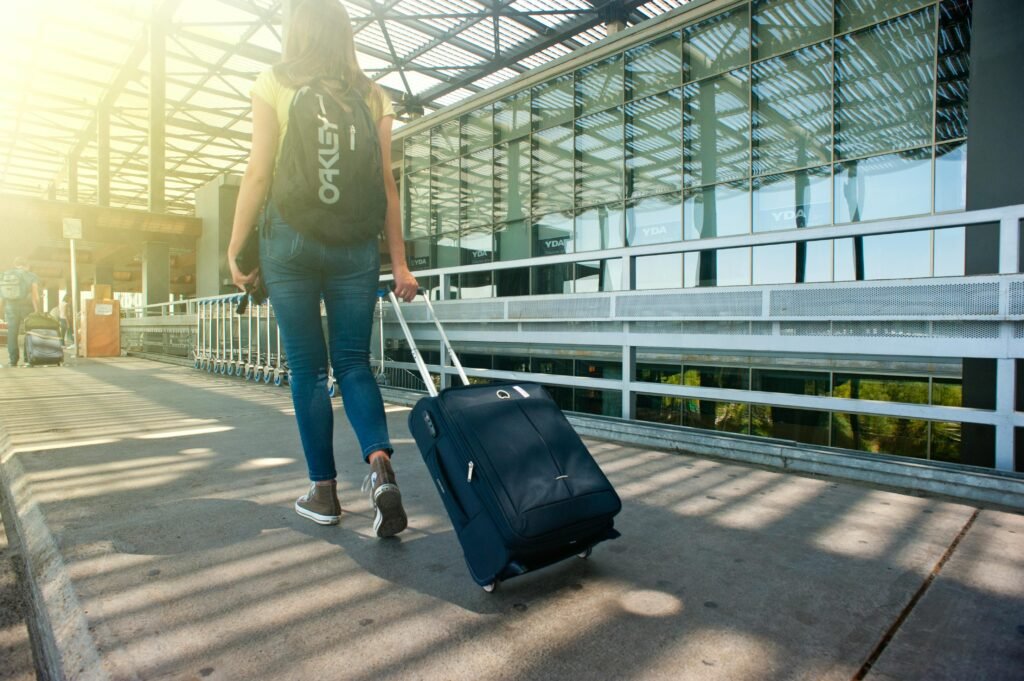Introduction: The Illusion of Constant Adventure
Traveling is often romanticized as an escape from the mundane, presenting an image of perpetual adventure infused with excitement and joy. This perception, fueled by social media and travel blogs, tends to overshadow the less glamorous realities that many travelers confront. In a world where experiences are curated and shared through the lens of sparkling vistas and thrilling escapades, the everyday struggles of travelers can be easily overlooked.

For many, the allure of travel comes attached with expectations of novelty and spontaneity, which can create a powerful illusion. However, behind this facade lies an often unspoken truth: burnout, loneliness, and scams are realities that affect countless travelers. As individuals continuously seek new destinations, they may find themselves trapped in a cycle of fatigue and emotional exhaustion. The pressures associated with planning and experiencing constant adventures can lead to overwhelming stress, causing travel burnout that detracts from the intrinsic joy of exploration.
Moreover, the sense of isolation often experienced while traveling contradicts the idea of being constantly surrounded by diverse cultures and new acquaintances. Loneliness can seep in during long trips, particularly for solo travelers who may struggle to connect with others in transient environments, even amidst bustling crowds. This paradox results in a sense of alienation that can be disheartening, detracting from the enriching experiences travel promises to deliver.
Finally, the probability of encountering scams is an unsettling reality for many travelers. These deceptive practices can undermine an otherwise thrilling journey, leading to mistrust and vulnerability. Recognizing these potential pitfalls is essential for fostering a more comprehensive understanding of the travel experience—one that balances the excitement of exploration with the necessity for awareness and self-care.
Understanding Travel Burnout
Travel burnout is a state of emotional and physical exhaustion that can occur when individuals travel frequently or for extended periods. The constant hustle and bustle of traveling—catching flights, navigating new cities, and managing itineraries—can take a toll on one’s mental health. While travel is often associated with adventure and excitement, it can also induce stress and fatigue, leading to a phenomenon known as travel burnout.

The symptoms of travel burnout vary but often include fatigue, irritability, and withdrawal from activities that were once enjoyable. For instance, a frequent traveler may begin to dread boarding another plane or feel overwhelmed by the prospect of planning their next trip. The thrill of exploration can turn into a chore, leaving individuals emotionally drained and mentally fatigued. Anecdotes from seasoned travelers underscore the significance of this issue. One such traveler, after a series of non-stop journeys for work and leisure, recounted feeling exhausted even in beautiful new settings, struggling to appreciate the scenery. Instead of feeling excited, they found themselves irritated and yearning for the comforts of home, ultimately taking a break from travel altogether to regain a sense of balance.
Another individual described how, after numerous back-to-back trips, they began to experience a sense of isolation despite being surrounded by new cultures and people. Instead of feeling invigorated by engagement with diverse environments, they withdrew from social interactions and struggled with feelings of loneliness. Recognizing these symptoms is crucial for travelers; identifying burnout early can help mitigate its impact. By acknowledging the darker side of travel, individuals can make informed choices about their journeys and prioritize their mental well-being, ensuring they can continue to explore the world without succumbing to the negative effects of travel burnout.
Loneliness on the Road: A Hidden Struggle
Traveling is often romanticized as an adventure filled with excitement and the thrill of exploration. However, for many travelers, particularly those venturing solo, it can also become a period marked by feelings of loneliness. The paradox arises when one finds themselves surrounded by new faces and vibrant cultures yet still grappling with a profound sense of isolation. The reality of loneliness on the road is a topic that deserves attention, as it can significantly impact mental well-being and the overall travel experience.

One compelling aspect of solo travel is the juxtaposition of social interactions during the day with feelings of solitude at night. For example, while attending a bustling festival or visiting a famous landmark, a solo traveler may feel a rush of energy from the crowd. Yet, upon returning to their accommodations, that high can quickly fade, leaving them in desolation. Personal anecdotes often illustrate this experience; for instance, a traveler may recount how they enjoyed engaging with locals in a market but later felt detached during dinner alone in their hotel room.
These feelings can make a traveler question their decision to embark on this adventure alone. Techniques for managing loneliness while traveling are essential to ensure that the experience remains enjoyable and fulfilling. Engaging with digital communities of fellow travelers can help bridge the gap of isolation, allowing individuals to share experiences and camaraderie, even from afar. Additionally, participating in group tours or local activities provides opportunities to connect and forge temporary friendships that alleviate the weight of solitude.
Ultimately, acknowledging the hidden struggle of loneliness on the road is crucial for those who travel solo. By employing effective strategies to combat these feelings, travelers can transform solitude into a chance for self-reflection and growth, enriching their journey in unexpected ways.
Scams and Safety Concerns: The Risks of Travel
Traveling can be a rewarding experience, yet it also poses various risks, particularly when it comes to scams and personal safety. Travelers may encounter a multitude of scams including financial scams, fake tours, and theft, which can tarnish their experience and, in some cases, lead to significant emotional and financial repercussions.
Financial scams often take the form of fraudulent currency exchange operations or schemes that involve overcharging for services. Travelers should be cautious in unfamiliar environments and verify exchange rates ahead of time. Using reputable banks or authorized exchange offices is one way to mitigate this risk. Additionally, tourists should be wary of individuals offering unofficial services, as these can often lead to inflated prices or subpar experiences.
Fake tours are another common scam encountered by travelers. Unscrupulous individuals may advertise guided tours that do not exist or offer experiences that fail to match the descriptions provided. To avoid falling victim to such scams, it is advisable to research tour operators thoroughly, read reviews from other travelers, and book through established platforms, ensuring the legitimacy of the services.

Theft, whether through pickpocketing or scams involving distraction techniques, is a significant concern for tourists. Travelers are encouraged to remain vigilant, especially in crowded areas. Utilizing anti-theft bags, securing valuables, and avoiding displaying large amounts of cash can help reduce the risk of theft. Moreover, trusting one’s instincts is essential; if a situation feels off, it is best to leave and seek a safer alternative.
Experiencing a scam can have an emotional toll, leading to feelings of violation, distrust, and anxiety about future travels. Engaging in discussions with seasoned travelers or consulting safety experts may provide reassurance and strategies to effectively enhance travel security. By acknowledging the potential risks and taking the necessary precautions, travelers can safeguard themselves and enjoy their journeys without unnecessary fear.
Coping with Travel-Related Mental Health Issues
Travel can be a deeply enriching experience, intended to broaden horizons and create lasting memories. However, it can also present significant mental health challenges, such as anxiety, loneliness, and depression. The excitement of visiting new destinations can quickly diminish if travelers find themselves overwhelmed by the unfamiliar environment, cultural differences, or social isolation. Recognizing these challenges is a vital step toward maintaining mental well-being while on the road.
Self-care becomes paramount when facing travel-related mental health issues. It is essential for travelers to carve out time for activities that promote relaxation and facilitate emotional balance. Simple practices such as mindfulness, meditation, or yoga can help mitigate feelings of anxiety, creating space for reflection and grounding amidst a potentially chaotic travel schedule. Establishing routines, even while on the go, can provide a sense of normalcy and comfort.
Moreover, it is crucial for travelers to recognize the signs of a mental health decline. Feelings of persistent sadness, irritability, or withdrawal from social interactions can indicate that it is time to seek support. Many travelers may overlook available mental health resources, but reaching out for help can be a vital part of the travel experience. Local mental health services, hotlines, or even support groups can provide valuable assistance. Online resources and apps can also offer guidelines for self-care or connect travelers to professional help, regardless of their geographical location.
Seeking mental health support during travel is not a sign of weakness but an essential step toward ensuring a more fulfilling travel experience. By prioritizing mental well-being and employing strategies for coping, travelers can navigate the challenges inherent to travel while still enjoying its many benefits. A focus on mental health ultimately transforms travel from a potential source of stress into an opportunity for personal growth and self-discovery.
The Impact of Social Media on Travel Experiences
In today’s digital age, social media plays a significant role in shaping travel expectations and experiences. Platforms such as Instagram, Facebook, and TikTok have transformed the way travelers perceive destinations, often presenting an idealized version of reality that can lead to unrealistic expectations. Travelers frequently seek to replicate stunning photographs and experiences showcased online, which may result in feelings of inadequacy when their real-life trips do not measure up to these curated portrayals.

The phenomenon of “FOMO” or fear of missing out is prevalent among travelers influenced by social media. As users scroll through seemingly flawless images of sunsets in Bali or picturesque streets in Paris, a sense of urgency develops, compelling individuals to visit these locations to capture similar moments. This desire can overshadow the intrinsic value of personal experiences and authentic interactions with local cultures, contributing instead to a superficial mindset about travel. Moreover, the pressure to share one’s journey can lead to not enjoying the moment fully, as attention shifts to capturing the “perfect” shot rather than immersing oneself in the surroundings.
Studies have shown that increased social media use can negatively impact mental health, leading to feelings of loneliness and inadequacy. Personal accounts reveal that travelers often experience disappointment when their actual travel experiences do not align with the picture-perfect images they encounter online. The expectation to maintain an online presence during vacations may create stress and detract from the relaxation and enjoyment typically associated with travel. Thus, it is essential for individuals to recognize the influence of social media on their travel experiences and to adopt a balanced approach, allowing room for authenticity and genuine moments rather than adhering strictly to the polished standards set by online images.
Balancing Adventure and Self-Care
Traveling is often viewed as an exhilarating escape from everyday life, yet it can lead to significant personal challenges, particularly in the realms of burnout and loneliness. Achieving a balance between adventure and self-care is essential for ensuring that travel remains a pleasurable experience rather than a source of stress. To cultivate this balance, travelers must incorporate strategic downtime into their itineraries. Setting aside moments to relax, recharge, and reflect can greatly enhance the overall travel experience, allowing individuals to savor the small joys of their journey.
In conjunction with incorporating downtime, it is crucial to establish realistic travel goals. Overpacking schedules can lead to fatigue, diminishing the essence of exploration. Travelers are encouraged to prioritize quality over quantity; focusing on a fewer number of destinations or experiences enables a deeper connection to each place visited. This approach not only aids in reducing the likelihood of burnout but also contributes positively to mental health, allowing travelers to immerse themselves fully in their surroundings.
Prioritizing both mental and physical well-being requires attention to various aspects of self-care while traveling. It is advisable to maintain regular meal times, stay hydrated, and engage in light exercise during travels. Mindful practices, such as meditation or journaling, can also foster a sense of peace, helping mitigate feelings of loneliness and anxiety. Finding a balance between adventure and self-care does not diminish the thrill of exploring new locales; instead, it enriches the travel experience by ensuring that one’s health and happiness remain at the forefront of the journey.
By being intentional about how one travels and recognizing the importance of self-care, travelers can enjoy their adventures more fully and avoid the negative repercussions that may accompany a neglect of personal well-being.
Authenticity in Travel: Embracing the Good and the Bad
Traveling is often perceived through a lens of glamour, adventure, and unforgettable experiences. However, it is essential to acknowledge that the reality of travel encompasses both cherished memories and challenging moments. Embracing authenticity in travel means recognizing the full spectrum of experiences, including the highs and lows. By sharing the entirety of one’s travel journey, individuals not only cultivate a richer narrative but also foster a more genuine connection with fellow travelers.
When people document their adventures, they frequently highlight picturesque landscapes and thrilling activities. Yet, it is equally important to share encounters with challenges such as navigating unfamiliar environments, experiencing feelings of loneliness, or even falling prey to scams. These challenging moments provide valuable context to the story and can serve as important lessons for others. By discussing these experiences, travelers can contribute to a more honest portrayal of what it truly means to journey through different cultures and regions.
Moreover, engaging with both the pleasant and troublesome aspects of travel encourages personal growth and resilience. Recognizing the struggles faced along the way can illuminate adaptive strategies, promote self-reflection, and enhance problem-solving skills. This authentic approach not only enriches one’s travel experience but also encourages others to be more open and appreciative of their journeys, regardless of the obstacles encountered.
Ultimately, authenticity in travel requires a willingness to embrace every aspect of the journey. By recounting tales of joy alongside stories of adversity, travelers can inspire a more inclusive understanding of the travel experience. Such openness can empower individuals to embark on their adventures with realistic expectations, fostering a mindset that appreciates the lessons learned from both the celebrations and the hardships endured along the way.
Conclusion: Navigating the Complexities of Travel
Traveling can be a profoundly enriching experience, yet it is not without its challenges. The darker sides of travel, such as burnout, loneliness, and the risk of scams, can overshadow the joys of exploration and adventure. As highlighted throughout this blog post, these issues are prevalent and can affect even the most seasoned travelers. Understanding these challenges is paramount to fostering a more authentic travel experience.
Burnout often arises from the frenetic pace of travel, characterized by a hectic itinerary and the pressure to see and do everything. Recognizing the signs of fatigue and allowing for downtime are crucial steps in mitigating this issue. Additionally, the isolation that can accompany travel highlights the importance of social connections, whether through organized tours or simply engaging with locals and fellow travelers. Building relationships can lessen feelings of loneliness and create more memorable experiences.
Moreover, the prevalence of scams, particularly in unfamiliar locales, requires vigilance and preparedness. Equipping oneself with knowledge about potential risks can significantly enhance safety and peace of mind. As travelers navigate these complexities, it is essential to cultivate resilience and adaptability.
Ultimately, acknowledging the darker aspects of travel does not diminish its allure; rather, it enriches the narrative. By sharing experiences and supporting one another, travelers can create a more realistic and compassionate understanding of what it means to journey into the world. We invite readers to share their own stories and reflections, fostering a community that embraces both the light and dark sides of travel. Together, we can navigate these complexities and enhance our collective experiences while traveling.



